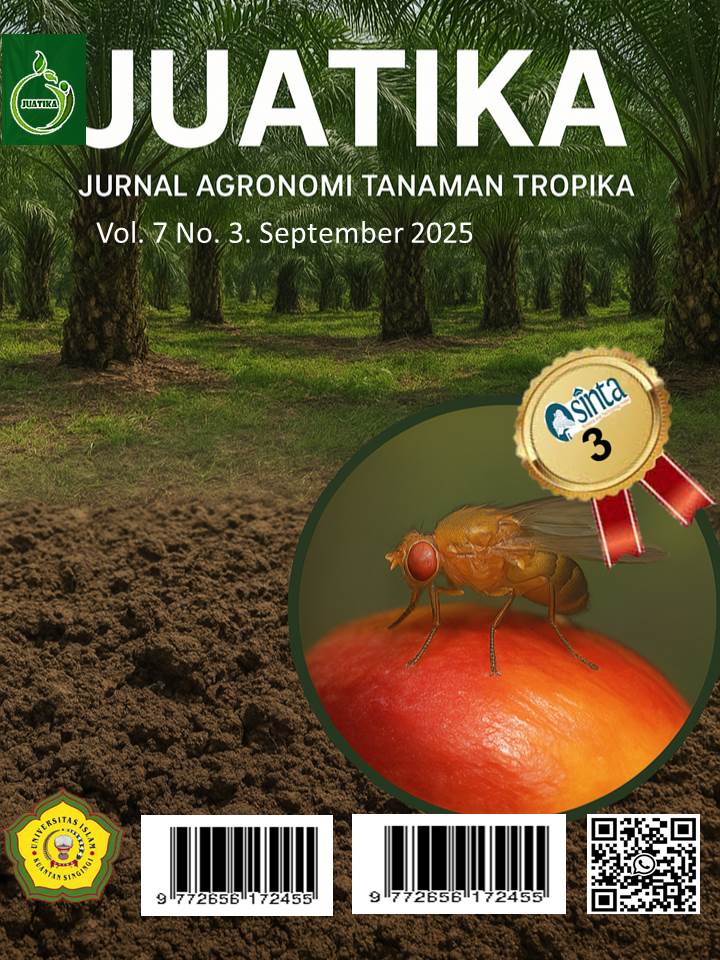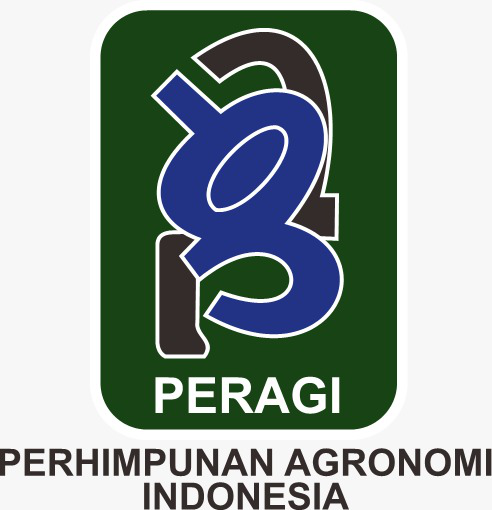Effectiveness of Seed Priming on Vigor and Viability of Moringa Seeds (Moringa oleifera L.)
Abstract
Moringa is often referred to as the "miracle tree" due to its rich nutrient content and medicinal properties. The increasing demand for moringa seeds has highlighted the need for effective propagation methods; however, germination remains limited by the hard seed coats and prolonged dormancy periods. This gap underscores the importance of studying moringa, particularly in efforts to enhance germination success and initial growth. This study aims to evaluate the effects of various seed priming materials, soaking durations, and the interactions between different types of seed priming materials and soaking times on the vigor and viability of moringa seeds. The research was conducted in the Biotechnology Laboratory and greenhouse at the Faculty of Agriculture, National Development University "Veteran" East Java. This study employed a Completely Randomized Design (CRD) with a factorial arrangement of two factors, comprising fifteen combinations and three replications. The first factor is the type of seed priming material (S), which includes Aqua Destillata, seaweed extract, coconut water, PEG 6000, and KNO3. The second factor is the soaking time for the priming solution (L), which consists of 12 hours, 24 hours, and 36 hours. Observations include germinability, maximum growth potential, growth rate, vigor index, and sprout weight. The combination treatment of PEG 6000 as the seed priming material with a soaking time of 12 hours yielded the highest average values for germination and maximum growth potential. A single treatment using PEG 6000 resulted in the highest average vigor index. Additionally, a single treatment with a soaking duration of 12 hours also produced the highest average vigor index. The results of this study can be recommended as optimal treatments to enhance the germination capacity and vigor of Moringa seeds.
Downloads
References
Afdharani, R., Hasanuddin, H., & Bakhtiar, B. (2020). Pengaruh bahan invigorasi dan lama perendaman pada benih padi kadaluarsa (Oryza sativa L.) terhadap viabilitas dan vigor benih. Jurnal Ilmiah Mahasiswa Pertanian, 4(1), 169–183. https://doi.org/10.17969/jimfp.v4i1.10361
Arthawijaya, R. A. P., Sulistyo, H. E., Kamaliyah, S. N., & Sudarwati, H. (2022). Pematahan proses dormansi benih tanaman centro (Centrosema pubescens) dengan penggunaan PEG (Polyethylene Glycol) 6000. Jurnal Nutrisi Ternak Tropis, 5(1), 7–22. https://doi.org/10.21776/ub.jnt.2021.005.01.2
Asih, P. R. (2021). Invigorasi mutu fisiologis benih terung ungu (Solanum melongena L.) kadaluarsa dengan beberapa teknik osmoconditioning. Agritrop: Jurnal Ilmu-Ilmu Pertanian (Journal of Agricultural Science), 18(2), 162–170. https://doi.org/10.32528/agritrop.v18i2.3905
Badan Pusat Statistik. (2024). Data ekspor impor nasional. Statistik Indonesia. https://www.bps.go.id
Davidz, L. S. P. (2023). Pengaruh jenis berbagai larutan seed priming dan lama perendaman terhadap vigoritas, viabilitas, dan pertumbuhan awal benih tanaman kelor (Moringa oleifera Lam.). Jurnal Ilmu Pertanian Indonesia, 28(2), 123–134. https://doi.org/10.24843/JIPI.2023.v28.i2.p123
Devitriano, D., & Syarifuddin, H. (2021). Penggunaan air kelapa muda sebagai zat pengatur tumbuh terhadap daya kecambah, vigoritas, berat kering biji tanaman kelor (Moringa oleifera). Jurnal Ilmiah Batanghari Jambi, 21(3), 949–953. http://dx.doi.org/10.33087/jiubj.v21i3
Farooq, M., Wahid, A., Kobayashi, N., & Basra, S. M. A. F. (2019). Plant drought stress: Effects, mechanisms and management. Agronomy for Sustainable Development, 29(1), 185–212. https://doi.org/10.1051/agro.2008021
Hernández-Herrera, R. M., González-González, M. F., Velasco-Ramírez, A. P., Velasco-Ramírez, S. F., Santacruz-Ruvalcaba, F., & Zamora-Natera, J. F. (2023). Seaweed extract components are correlated with the seeds germination and growth of tomato seedlings. Seeds, 2(4), 436–448. https://doi.org/10.3390/seeds2040033
Lesilolo, M. K., Riry, J., & Matatula, A. (2018). Pengujian viabilitas dan vigor benih beberapa jenis tanaman yang beredar di pasaran Kota Ambon. Agrologia, 2(1), 1–9. https://doi.org/10.30598/a.v2i1.272
Lewu, L. D., Uru, R. R., Ambu, L., Hinda, I. D., Welik, N. N., Raga, N. A., & Mandaha, M. (2023). Pengaruh konsentrasi ekstrak rumput laut (Sargassum polycystum) terhadap viabilitas benih sorgum. SATI: Sustainable Agricultural Technology Innovation, 2(1), 122–127. https://doi.org/10.52434/jagros.v6i2.2040
Nugroho, S. A., Setyoko, U., Fatimah, T., & Novenda, I. L. (2022). Pengaruh alelopati tanaman gamal (Gliricidia maculata) dan kirinyuh (Eupatorium odoratum) terhadap perkecambahan kacang hijau (Vigna radiata). Agropross: National Conference Proceedings of Agriculture, 180–188. https://doi.org/10.25047/agropross.2022.287
Oktafianus, S., & Kannapadang, S. (2025). Evaluation of tolerance of several corn genotypes (Zea mays L.) to salinity stress at the germination stage. Jurnal Agronomi Tanaman Tropika (Juatika), 7(2). https://doi.org/10.36378/juatika.v7i2.4282
Paramita, K. E., Suharsi, T. K., & Surahman, M. (2018). Optimasi pengujian daya berkecambah dan faktor yang mempengaruhi viabilitas dan vigor benih kelor (Moringa oleifera Lam.) dalam penyimpanan. Buletin Agrohortikultura, 6(2), 221–230. https://doi.org/10.29244/agrob.v6i2.19092
Rosalyne, I., Sihaloho, A., & Suseno, T. (2021). Pengaruh bahan dan lama perendaman terhadap pemecahan dormansi benih kopi (Coffea arabica L.). Jurnal Rhizobia, 3(1), 11–18. https://doi.org/10.36985/rhizobia.v10i1.460
Saputra, D., Zuhry, E., & Yoseva, S. (2017). Pematahan dormansi benih kelapa sawit (Elaeis guineensis Jacq.) dengan berbagai konsentrasi kalium nitrat (KNO3) dan pengaruhnya terhadap pertumbuhan bibit pada tahap pre nursery. Jurnal Online Mahasiswa Fakultas Pertanian, 4(2), 1–15.
Saputri, L. D., Zakiah, Z., Rusmiyanto, E., & Wardoyo, P. (2022). Bauji shallot variety (Allium ascalonicum L.) growth response and yield after kirinyuh plant methanol extract (Chromolaena odorata L.) treatment. Jurnal Agronomi Tanaman Tropika (Juatika), 4(2), 263–272. https://doi.org/10.36378/juatika.v4i2.2000
Sari, R. N., & Palupi, T. (2020). Pengaruh osmoconditioning dengan larutan PEG (Polyethylene Glycol) 6000 terhadap viabilitas dan vigor benih padi yang telah mengalami kemunduran. Jurnal Sains Pertanian Equator, 9(4).
Sativa, N., Baharzyah, R. M., Hidayati, H., & Rismayanti, A. Y. (2022). Pengaruh berbagai konsentrasi PEG (Polyethylene Glycol) 6000 dan lama perendaman terhadap vigor benih jintan hitam (Nigella sativa). Jurnal Agroteknologi dan Sains, 6(2), 125–133. https://doi.org/10.52434/jagros.v6i2.2040
Sun, S., Hu, S., Zhang, B., Sun, X., & Xu, N. (2021). Allelopathic effects and potential allelochemical of Sargassum fusiforme on red tide microalgae Heterosigma akashiwo. Marine Pollution Bulletin, 170. https://doi.org/10.1016/j.marpolbul.2021.112673
Tanjung, I. F., Tumanggor, A. S., Rizki, M., Thahira, N., & Ramadhani, F. (2023). Inventory of potentially allelopathic plants in Laut Dendang Village and their effects on mustard greens (Brassica juncea L.). Jurnal Biologi Tropis, 23(1), 479–485. https://doi.org/10.29303/jbt.v23i1.4610
Trisnawaty, R. A., Megasari, R., Arnama, I. N., & Yamin, M. (2024). Pertumbuhan dan produksi padi (Oryza sativa L.) hasil priming konsentrasi PEG-6000 pada cekaman kekeringan. Jurnal Galung Tropika, 13(2), 268–278. https://doi.org/10.31850/jgt.v13i2.1272
Wang, Y., Zhou, E., Yao, M., Xue, D., Zhao, N., Zhou, Y., … & Wei, L. (2023). PEG-6000 priming improves aged soybean seed vigor via carbon metabolism, ROS scavenging, hormone signaling, and lignin synthesis regulation. Agronomy, 13(12), 3021. https://doi.org/10.3390/agronomy13123021
Winarni, E., Fitriani, A., Purnomo, P., & Panjaitan, S. P. (2018). Daya kecambah benih rotan jernang (Daemonorops draco Blume) dengan berbagai perlakuan perendaman dalam air. Jurnal Hutan Tropis, 5(2), 120. https://doi.org/10.20527/jht.v5i2.4365
Yuanasari, B. S., Kendarini, N., & Saptadi, D. (2015). Peningkatan viabilitas benih kedelai hitam (Glycine max L. Merr) melalui invigorasi osmoconditioning. Jurnal Produksi Tanaman, 3(6), 518–527. https://doi.org/10.21176/protan.v3i6.230
Yuliani, G. K., Komariah, A., & Indriana, K. R. (2023). Pengaruh lama perendaman dan konsentrasi KNO3 terhadap viabilitas dan vigor benih padi (Oryza sativa L.). Paspalum: Jurnal Ilmiah Pertanian, 11(2), 208. https://doi.org/10.35138/paspalum.v11i2.570
Yulistiati, N., & Hartawan, R. (2017). Penggunaan larutan kimia dalam pematahan dormansi benih kopi liberika. Jurnal Media Pertanian, 2(2), 85–91. http://dx.doi.org/10.33087/jagro.v2i2.39
Zahra, S., & Isda, M. N. (2023). Lama waktu perendaman biji pala (Myristica fragrans H.) dengan penambahan kalium nitrat (KNO3) terhadap perkecambahan biji. Bio-Lectura: Jurnal Pendidikan Biologi, 10(1), 82–90. https://doi.org/10.31849/bl.v10i1.12143
Copyright (c) 2025 Nela Octavia Sari, Nova Triani, Pangesti Nugrahani

This work is licensed under a Creative Commons Attribution 4.0 International License.
Authors who publish with Jurnal Agronomi Tanaman Tropika (JUATIKA) agree to the following terms:
Authors retain copyright and grant the Jurnal Agronomi Tanaman Tropika (JUATIKA) right of first publication with the work simultaneously licensed under a Creative Commons Attribution License (CC BY 4.0) that allows others to share (copy and redistribute the material in any medium or format) and adapt (remix, transform, and build upon the material for any purpose, even commercially) with an acknowledgment of the work's authorship and initial publication in Jurnal Agronomi Tanaman Tropika (JUATIKA).
Authors are able to enter into separate, additional contractual arrangements for the non-exclusive distribution of the journal's published version of the work (e.g., post it to an institutional repository or publish it in a book), with an acknowledgment of its initial publication in Jurnal Agronomi Tanaman Tropika (JUATIKA). Authors are permitted and encouraged to post their work online (e.g., in institutional repositories or on their website) prior to and during the submission process, as it can lead to productive exchanges, as well as earlier and greater citation of published work.







 More Information
More Information



